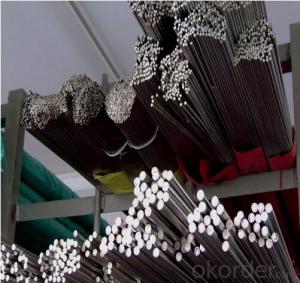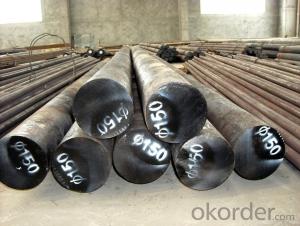Tool Steel SKD10,Cr12Mo1V1, D2,1.2379,2379 Steel Round Bar
- Loading Port:
- China main port
- Payment Terms:
- TT OR LC
- Min Order Qty:
- 25 m.t.
- Supply Capability:
- 10000 m.t./month
OKorder Service Pledge
OKorder Financial Service
You Might Also Like
Item specifice
The details of our Steel
1. Produce Standard: as the GB, AISI, ASTM, SAE, EN, BS, DIN, JIS Industry Standard
2. Produce processes: Smelt Iron -EAF smelt Billet - ESR smelt Billet -Hot rolled or forged get the steel round bar and plate
3. Heat treatment:
Normalized / Annealed / Quenched+Tempered
4. Quality assurance:
All order we can received Third party inspection, You can let SGS, BV,.. and others test company test and inspect our products before Goods shipping.
Product information
1.ChemicalComposition(%) | CSiMnCrMoVPS1.40-1.60≤0.40≤0.60≥11≥0.8≥0.2≤0.030≤0.030
|
2.Equivalent Grades | SKD10/ D2/ 1.2379 |
3.Form&Size | 1)1.2379 Tool Steel round bars, flat/square bars,plates,sheets. |
2)DIN 1.2379 Tool Steel Size Available(Length can be customized)
| |
4.Round bar | Diameter (mm) Length (mm) Round bar: 12~50 x 2000~5800 Hot rolled |
5.Flat bar | Thickness(mm) Width(mm) Length (mm) |
6.Surface Condition | 1)Black,Peeled,Turned,Grinded; 2)D2 die steel should be free of heavy scale,deep pitting,laps,porosity,injurious segregations,excessive nonmetallic inclusions,seams,cracks,slivers,scale marks,dents,soft and hard spots,pipes or any defects that would detrimentally affect the suitability of 1.2379 mold steel. 3)Visual examination for D2 mould steel shall be made to ensure compliance with the requirements for workmanship,finish,dimensions and tolerances,identification marking and packaging. |
7.Straightness | The permissible deviation of 1.2379 tool steel shall not exceed 3mm in 1000mm length.This applies also to bars under 1000mm in length.Measurement is taken on the concave side of D2 steel with a straight edge. |
8.Hardness | AISI 1.2379 tool steel annealed hardness values when obtained in accordance with the latest issue of test methods and definitions A370 shall not exceed 255 Brinell. |
9.HeatTreatment | Annealing |
Hardening | |
Tempering | |
10. Other Tool Steel and Mould Steel grade |
D3/1.2080/X120Cr12, D2/1.2379, SKD11, H13/1.2344, H11/1.2343/4X5MΦC, H21/1.2581, Cr12MoV/ X12MΦ, O1, O2, A2, P20, 1.2714, M2, M3, T1, 4Cr13/40X13, 2Cr13, 9Cr18, DC53, NAK80 etc. |
Product show

Workshop show

- Q:What are the different heat treatment methods used for special steel?
- There are several heat treatment methods used for special steel, including annealing, quenching, tempering, normalizing, and case hardening.
- Q:What are the main characteristics of tool steel forgings?
- Tool steel forgings have several main characteristics that make them highly desirable for a variety of applications. First and foremost, tool steel forgings are known for their exceptional durability and strength. They are specifically designed to withstand high levels of stress, making them ideal for applications where toughness and resistance to wear and tear are crucial. This strength allows tool steel forgings to maintain their shape and integrity even under extreme conditions, such as high temperatures or heavy loads. Another key characteristic of tool steel forgings is their excellent hardness. Tool steel is able to achieve high levels of hardness through a process called quenching and tempering, which involves heating the steel to a specific temperature and then rapidly cooling it. This hardness makes tool steel forgings highly resistant to abrasion, making them suitable for cutting, shaping, and forming materials. Additionally, tool steel forgings exhibit excellent dimensional stability. This means that they have minimal distortion or shrinkage when subjected to heat or pressure, making them ideal for precision tooling applications. Their dimensional stability also ensures that the forgings maintain their accuracy and reliability over time, which is essential in industries such as manufacturing and engineering. Furthermore, tool steel forgings offer good machinability, meaning they can be easily shaped, drilled, and cut to meet specific requirements. This makes them versatile and adaptable for a wide range of applications, from forming complex shapes to creating intricate designs. Lastly, tool steel forgings have excellent wear resistance. This characteristic allows them to maintain their cutting edges and surfaces for extended periods, reducing the need for frequent sharpening or replacement. This wear resistance is particularly advantageous in industries such as automotive, aerospace, and tool manufacturing, where longevity and efficiency are paramount. In conclusion, the main characteristics of tool steel forgings include exceptional durability and strength, high hardness, excellent dimensional stability, good machinability, and excellent wear resistance. These characteristics make tool steel forgings highly sought after in various industries, where reliability, precision, and longevity are critical.
- Q:Can special steel be heat treated?
- Yes, special steel can be heat treated. Heat treatment is a process used to alter the physical and mechanical properties of steel by heating it to specific temperatures and then cooling it at controlled rates. This treatment allows for the adjustment of hardness, strength, toughness, and other desired characteristics in special steel.
- Q:How does special steel perform in radiation shielding applications?
- Special steel is widely recognized for its exceptional performance in radiation shielding applications. Its unique properties and composition make it an ideal choice for protecting against harmful radiation. One of the key advantages of special steel is its high density, which enables it to effectively absorb and attenuate radiation. This property allows it to act as a barrier, preventing the penetration of harmful radiation into sensitive areas. Special steel can significantly reduce the amount of radiation exposure, making it an essential material in various industries, including nuclear power plants, medical facilities, and aerospace applications. Furthermore, special steel possesses excellent mechanical strength and durability, which ensures long-lasting and reliable radiation shielding. It can withstand extreme conditions and maintain its shielding effectiveness over time. This durability is crucial, especially in environments where radiation exposure is continuous or ongoing. Moreover, special steel is highly resistant to corrosion and degradation, which is essential in radiation shielding applications. It ensures that the material remains intact and capable of providing the necessary protection against radiation for an extended period. This resistance to corrosion also reduces the need for frequent maintenance and replacement, resulting in cost savings and enhanced operational efficiency. In addition to its physical properties, special steel can be tailored to specific requirements, allowing for custom designs and configurations. This flexibility enables the development of radiation shielding solutions that are optimized for the unique needs of different applications. Whether it is the design of shielding panels, containers, or enclosures, special steel can be adapted to provide the most effective and efficient radiation protection. Overall, special steel performs exceptionally well in radiation shielding applications due to its high density, mechanical strength, durability, corrosion resistance, and customization capabilities. It offers reliable and long-lasting radiation protection, ensuring the safety of personnel and equipment in various industries where radiation exposure is a concern.
- Q:How does special steel perform in terms of fatigue resistance?
- Special steel typically exhibits excellent fatigue resistance due to its high strength, toughness, and ability to withstand repeated loading and stress cycles without failure. Its unique composition and manufacturing processes enhance its resistance to fatigue, making it a preferred choice in applications where durability and longevity are critical, such as aerospace, automotive, and engineering industries.
- Q:Can special steel be used in the pharmaceutical manufacturing equipment manufacturing industry?
- Yes, special steel can be used in the pharmaceutical manufacturing equipment manufacturing industry. Special steel alloys such as stainless steel are commonly used due to their corrosion resistance, durability, and ability to withstand high temperatures and harsh chemicals. These qualities make special steel a suitable choice for various equipment used in pharmaceutical manufacturing, including tanks, reactors, mixers, and piping systems.
- Q:What is the impact of impurities on the machinability of special steel?
- Impurities can have a significant impact on the machinability of special steel. These impurities can cause variations in the material's hardness, toughness, and other mechanical properties, making it more difficult to machine. They can also lead to increased tool wear and reduced cutting speeds, resulting in lower productivity and increased production costs. Therefore, it is crucial to minimize impurities during the manufacturing process to ensure optimal machinability of special steel.
- Q:How does special steel contribute to reducing energy consumption?
- Special steel contributes to reducing energy consumption in several ways. Firstly, special steel is known for its high strength and durability, allowing it to be used in the construction of lightweight structures. This helps in reducing the overall weight of vehicles, machinery, and buildings, resulting in lower energy requirements for their operation and transportation. Additionally, special steel is used in the manufacturing of energy-efficient appliances and equipment, such as turbines and generators, which optimize energy conversion and minimize energy losses. Furthermore, special steel is often used in the production of renewable energy systems like wind turbines and solar panels, enabling the efficient generation of clean energy. Overall, the unique properties of special steel help in achieving energy efficiency goals and promoting sustainable practices.
- Q:How is heat-resistant steel used in the production of furnaces and boilers?
- Heat-resistant steel is used in the production of furnaces and boilers due to its ability to withstand high temperatures. It is utilized in various components such as heat exchangers, tubes, and piping systems, ensuring efficient heat transfer and preventing structural damage. This steel's resistance to oxidation and corrosion guarantees longevity and reliability, making it an essential material for manufacturing furnaces and boilers.
- Q:What are the main applications of special steel in the marine sector?
- Special steel is widely used in the marine sector for various applications. Some of the main applications include the construction of ship hulls, offshore platforms, and marine structures. Special steel's high strength, corrosion resistance, and durability make it suitable for withstanding harsh marine environments. Additionally, special steel is used in propeller shafts, rudders, and other critical components, ensuring efficient and reliable performance of marine vessels.
1. Manufacturer Overview |
|
|---|---|
| Location | |
| Year Established | |
| Annual Output Value | |
| Main Markets | |
| Company Certifications | |
2. Manufacturer Certificates |
|
|---|---|
| a) Certification Name | |
| Range | |
| Reference | |
| Validity Period | |
3. Manufacturer Capability |
|
|---|---|
| a)Trade Capacity | |
| Nearest Port | |
| Export Percentage | |
| No.of Employees in Trade Department | |
| Language Spoken: | |
| b)Factory Information | |
| Factory Size: | |
| No. of Production Lines | |
| Contract Manufacturing | |
| Product Price Range | |
Send your message to us
Tool Steel SKD10,Cr12Mo1V1, D2,1.2379,2379 Steel Round Bar
- Loading Port:
- China main port
- Payment Terms:
- TT OR LC
- Min Order Qty:
- 25 m.t.
- Supply Capability:
- 10000 m.t./month
OKorder Service Pledge
OKorder Financial Service
Similar products
New products
Hot products
Hot Searches
Related keywords





























